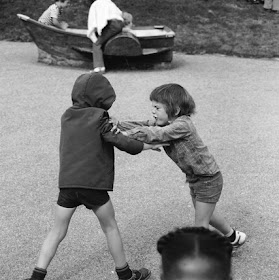He said that he himself would never prosecute anyone for personal injury nor recommend it to anyone else who claimed to be a philosopher. For actually none of the things which people fancy they suffer as personal injuries are an injury or a disgrace to those who experience them, such as being reviled or struck or spit upon.
Children can do both truly wonderful and truly horrible things, and in this they are only little instances of all of human nature. When I was five years old, our family moved to a new home in a new neighborhood, and I had before me the exciting but frightening prospect of seeing if I could come across some new friends.
It would be an early lesson about the good and the
bad in people, about discovering kindness in some and malice in others, though
I don’t really know if it was a relief or a frustration to see that folks, both
young and old alike, were really all made of the same stuff. I could already
discern something about the same patterns, popping up over and over from place
to place and from time to time.
My new little corner of the world had an odd quirk,
however, one that has vividly stuck in my memory now for many years. If
children, in quite the range of ages, started arguing with too much gusto, the
whole conversation would break down. The aggrieved parties would retreat back
to the confines of their own yards and continue to yell loudly at one another
from a distance.
“Don’t you dare come onto my property! If you do, I’ll
sue you! I’ll sue you!” This was often accompanied by wild gestures, indicating
the limits of said domains. When I asked my parents about this ritual, they
rolled their eyes and mumbled something about how we had become a “litigious
society”. I didn’t understand what they meant then, but I most certainly do
now.
Whether it be the children bickering around the
neighborhood, or the adults fighting it out in the office buildings downtown,
the tendency is all too familiar. It may begin with whispered gossip, continue
with insults and raised voices, and perhaps even proceed to the trading of blows.
The grown-ups, of course, tend to frown upon physical force, so they may appeal
to other more subtle, but equally violent, means of doing harm. Instead of
punching you in the face, they can make sure you never find work again.
When all these avenues have been exhausted, and the
anger is still not satisfied, people are tempted to appeal to a higher judgment.
They complain to a superior, or report it to the authorities, or bring it to the
law courts. God tends to advise forgiveness, so He will not be of much use
here, though a misguided clergyman can certainly help you exact your revenge,
if you are so inclined.
And revenge is really what it all too easily ends
up being about, inflicting hurt when we feel that we have been hurt. We may
call it justice, or the rule of law, or righting a wrong, but I wonder if what
we often really intend is retaliation, the imposition of force, or outdoing one
wrong with another wrong.
We can indeed debate the specifics of the terms, but
we can know the real difference by looking into our own hearts and minds, by
asking ourselves what we really wish to achieve: is it to find a benefit for
all, or is to seek a benefit for some through a harm to others?
Instead of an accusation, or a lawsuit, or a
condemnation being an absolute last resort, it becomes a casual routine. Instead
of a punishment being a form of restoring balance, it becomes an expression of contempt.
Instead of seeking to reform the offender, we take satisfaction in destroying
him.
The Stoic avoidance of vengeance begins with the
realization that, as social creatures, we are all made for one another, not to stand
in opposition to one another. Yet it goes even further than that, by reminding
us that so many of the things we perceive as insults, offenses, or injuries need
not really do us any deeper harm at all. Why should we feel resentment for what
only hurts us if we ourselves allow it to do so?
Yes, a man may damage my property, or weaken my
reputation, or bring pain on my body, and he himself indeed commits a wrong by
doing so, but he only affects what is on the outside of me, not what is on the
inside of me. He has gravely damaged his own soul, even as mine can remain intact.
Where is the greater hurt? His vice does not need to become mine, as long as I
do not respond with hatred.
Once again, the Stoic Turn involves far more than just
tweaking or rearranging our usual customs; it asks us to rebuild all our
judgments from the bottom up, to never meet evil with evil, and to always take control
over whether or not we decide to take offense.
Written in 10/1999

No comments:
Post a Comment